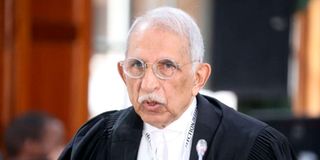IEBC chairman Wafula Chebukati’s conduct questioned

Lawyer Pheroze Nowrojee who was representing Mr Raila Odinga at the Supreme Court.
Interpretation of the powers the electoral commission chairman Wafula Chebukati holds dominated proceedings on the final day of hearing of the presidential petitions by the Supreme Court Friday.
While lawyers representing Mr Chebukati insisted that the Independent Electoral and Boundaries Commission (IEBC) chairman holds executive powers in tallying and verification of votes, petitioners argued that an imperial boss was not envisioned by the makers of the constitution.
In pushing for Mr Chebukati’s removal from office, Mr Odinga’s team said the Supreme Court does not have to issue orders for the same, as the constitution has a safeguard for rogue state officers.
“It was the intention of the makers (of the constitution) that the commission should have an executive chairperson. We have to proceed on what is in the constitution. The chairperson rushed to judgment without the 27 constituency results because of the doctrine of necessity, said counsel Kindiki in justification of this,” Mr Pheroze Nowrojee said on behalf of Mr Odinga.
Mr Tom Macharia, representing Youth Advocacy Africa, argued that Mr Chebukati elevated himself to returning officer of the presidential election without supporting legislation, and then violated past court decisions to the effect that results from polling stations are final.
Chairman’s blunders
Mr Macharia said that the IEBC chairman’s blunders started before Kenyans went to the vote. He questioned why the electoral agency settled on Smartmatic, a company that has been accused of triggering election postponements in Nigeria, to print ballots for Kenya’s polls.
Earlier in the day, Mr Chebukati’s legal team had defended his move to declare William Ruto the president-elect before reading out results from 27 constituencies that had been pending for the better part of August 15.
Mr George Murugu argued that Mr Chebukati was worried of the safety of IEBC staffers, whom the lawyer claimed were facing arrest by anti-terror police.
“He made considerations to his staff who at that time were suffering arrests, abductions and even injuries to commissioners. There was also a legitimate expectation (from the public) that the results would be announced on August 15 as had been stated that morning,” Mr Murugu added.
Misinterpreted the constitution
Mr Tom Ojienda, who is part of Okiya Omtatah’s legal team, added that Mr Chebukati had misinterpreted the constitution and unlawfully sidelined other commissioners.
Prof Ojienda argued that the IEBC chairperson is a first among equals, and cannot claim to have more power or authority than other commissioners. Petitioners in the suit, led by Azimio candidate Raila Odinga, asked the Supreme Court to nullify the election on account of the dysfunction at the IEBC.
Four commissioners – Juliana Cherera, Francis Wanderi, Justus Nyang’aya and Irene Masit – claimed in their court papers that Mr Chebukati has since their apppointments to the IEBC excluded them from crucial processes.
Wrote to Chebukati
Through lawyer Apollo Mboya, the four commissioners said they wrote to Mr Chebukati in April concerning the manner in which the IEBC chair was running the commission to their exclusion.
They said they were allocated roles that had nothing to do with tallying and verification.
Mr Paul Mwangi, one of Mr Odinga’s lawyers, added that the four commissioners cannot be said to have been involved in tallying and verification when they read out erroneous mistakes.
Ms Cherera in her affidavit said Mr Chebukati handed them final results he claimed were verified from IEBC’s back end server.
By Brian Wasuna, Joseph Wangui and Richard Munguti





